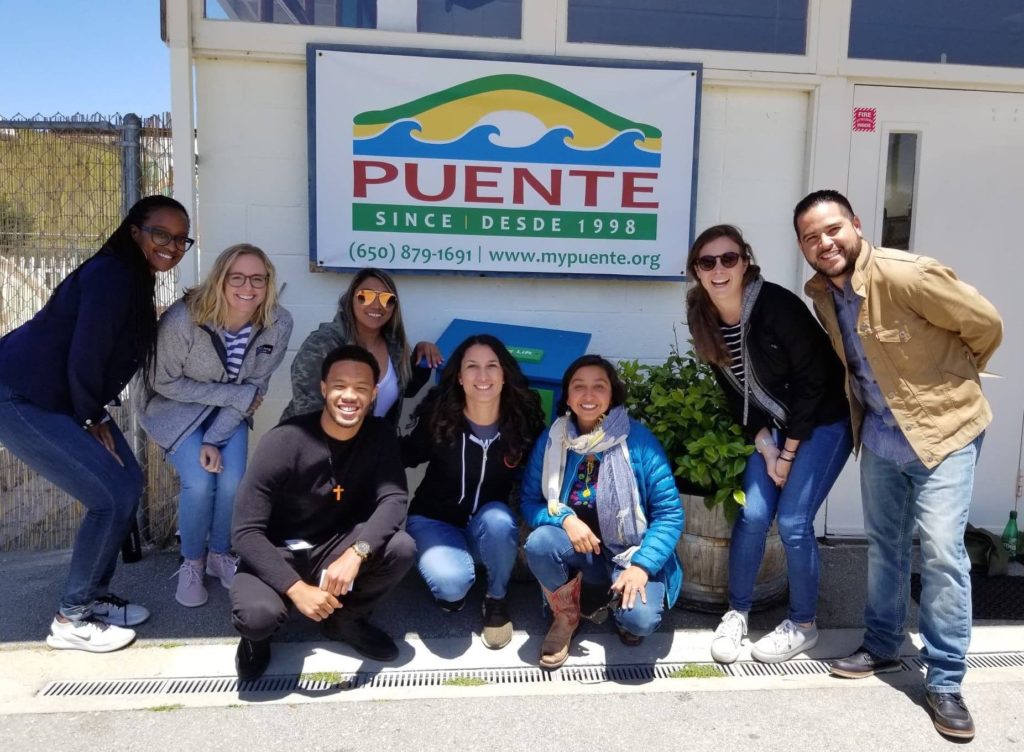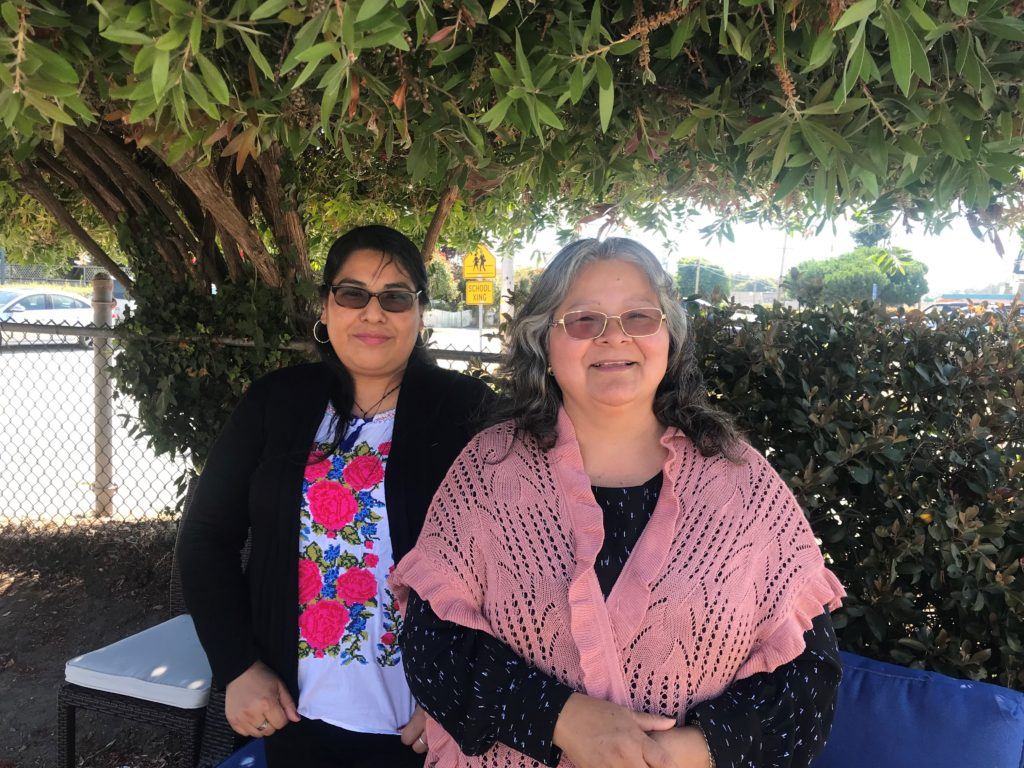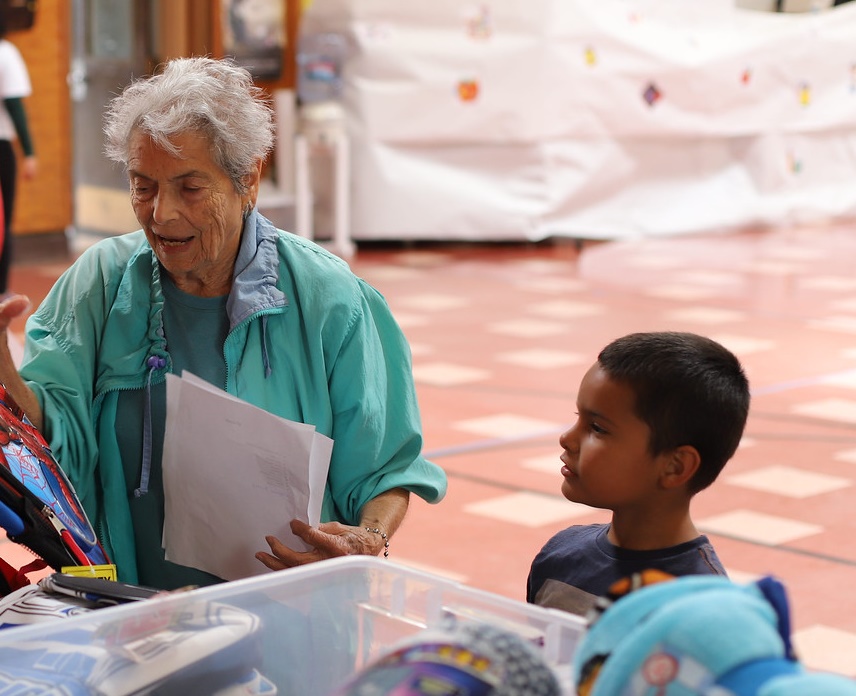
Chan Zucherberg Initiative staff visit Puente this past June. El personal de la Iniciativa de Chan Zucherberg vistitan a Puente en Junio.
Rita Mancera remembers the phone call she got in November 2018. On the other end of the line was Darnell Cadette, a manager with the Chan Zuckerberg Initiative (CZI). He introduced himself, told her about CZI, and then said something unexpected: his organization recently learned about Puente and was interested in supporting their work–immediately.
The Chan Zuckerberg Initiative was established by Facebook founder Mark Zuckerberg and his wife Dr. Priscilla Chan. Its Community team, which Cadette is a member of, is focused on building out CZI’s philanthropic presence in the Bay Area and specifically in San Mateo County, where it has awarded grants to more than 60 local organizations.
“We’re really thinking about how we live our values locally. This is our backyard, our home,” says Cadette. CZI became aware of Puente in the course of researching core service providers in San Mateo County that were working on the twin issues of housing stability and homelessness, which is a major focus of the CZI Team.
But Cadette wasn’t looking to dictate what he wanted to fund. He told Mancera that he wanted to support projects identified by Puente, and that he trusted her to tell him what the community really needed.
“He said, ‘You tell me what you need, and we will tell you what we can fund,’” she remembers.
She put together a proposal for several programs as well as general fund support for Puente, totaling $320,000. She was staggered when CZI approved the entire grant.
“For a new relationship with Puente, that was very significant,” says Mancera. She also learned that CZI’s local commitment to supporting children, youth and families experiencing homelessness and housing instability expanded across San Mateo County, and that the team had a strong desire to serve the South Coast community.
“It’s usually the case that we are the ones putting ourselves on the map so that people know the region exists, that Puente exists. This was kind of the opposite – they reached out and said, ‘We know you exist, we know you’re doing good work and we want to support it,’” she says.
Puente has close relationships with its foundations. So, before Mancera would consider writing a grant proposal, she told him she needed to meet him. She wanted to give him a tour of Puente, and to introduce him to Pescadero. On the South Coast, when it comes to challenges like farm worker housing and clean drinking water, knowing is one thing, seeing another.
Mancera and Cadette hit it off right away. The visit, in late December, was “an eye-opening experience,” says Cadette. “I appreciated the opportunity to drive through Pescadero with Rita–to see the community first hand and to hear directly from local residents about their challenges, their hopes for their community, and their vision for making those hopes a reality.”
After the initial visit with Mancera, Cadette told his co-workers about the experience. Several other CZI staff members came to Puente for a follow-up tour a short time later.
Mancera was impressed with the openness and genuine interest in the South Coast displayed by everyone at CZI.
“I was thrilled to see that they went beyond the attitude of, ‘We’ll write a check and then we’ll write a report about it.’ They came to get to know our community better.”
Cadette has observed some parallel challenges at play in under-served parts of Pescadero and other local communities like East Palo Alto, such as low-wage jobs, educational gaps and food security. But he noted that the way these challenges manifest themselves along the coast is unique – and that will call for context-specific solutions.
With that in mind, the Chan Zuckerberg Initiative supported several programs at Puente:
- The funding replaced a lost behavioral services grant that the county had stopped supporting. Thanks to the new funding, Puente could continue offering its mental health support services without a hitch.
- Puente was able to make a huge leap forward in its childcare co-op renovation project. Once the renovations are complete, Puente will seek state licensing for the childcare center, which will allow Puente to admit more local children.
- Puente’s education team was able to hire a second education associate, a new position that helps manage both Puente’s adult education program and its expanded youth program, which runs over the full academic year.
- Finally, Puente’s general operations funding increased in a very important way: For a long time, Puente wanted to pay living wages to its staff at all levels. “We particularly wanted to ensure that Puente was paying fair wages to its support staff so we increased the minimum wage to $18”.
Supporting programs like these plays into CZI’s long-term goal of reducing, and ultimately preventing,homelessness for vulnerable communities, according to Cadette.
“Providing a high-quality early childhood educational experience for children in daycare, for example, will set them up to be successful as they mature. Enabling access to behavioral health services is critical to the health of our communities, especially in supporting our local residents who are navigating complex, and sometimes traumatic, challenges.”
CZI officially launched their homeless strategy last October and hopes to continue working with organizations like Puente in this work. Similarly, Mancera is eager to work with CZI on any and all solutions that can lift farm workers and their families out of the challenging situations they have to endure.
We are very grateful for the support that CZI has given Puente and are very happy for this new partnership to continue our work on the South Coast. If you would like to donate to our programs and services, please click here.
Iniciativa Chan Zuckerberg invierte en Puente
Rita Mancera recuerda la llamada telefónica que recibió en noviembre de 2018. En el otro lado de la línea estaba Darnell Cadette, gerente de la Iniciativa Chan Zuckerberg (CZI). Él se presentó, le contó sobre CZI y luego dijo algo inesperado: su organización recientemente se enteró de Puente y estaba interesado en apoyar su trabajo, de inmediato.
La Iniciativa Chan Zuckerberg fue establecida por el fundador de Facebook Mark Zuckerberg y su esposa, la Dra. Priscilla Chan. Su equipo comunitario, del cual es miembro Cadette, se enfoca en desarrollar la presencia filantrópica de CZI en el Área de la Bahía y específicamente en el Condado de San Mateo, donde ha otorgado subvenciones a más de 60 organizaciones locales.
“Realmente estamos pensando en cómo vivimos nuestros valores localmente. Este es nuestro patio trasero, nuestro hogar, ” dice Cadette. CZI se dio cuenta de Puente en el curso de la investigación de proveedores de servicios centrales en el Condado de San Mateo que estaban trabajando en los problemas gemelos de la estabilidad de la vivienda y la falta de vivienda, que es un enfoque principal del equipo de CZI.
Pero Cadette no buscaba dictar lo que quería financiar. Le dijo a Mancera que quería apoyar proyectos identificados por Puente, y que confiaba en ella para decirle lo que la comunidad realmente necesitaba.
“Él dijo:” Dígame lo que necesita y le diremos lo que podemos financiar, ” ” recuerda.
Ella formuló una propuesta para varios programas, así como el apoyo de fondos generales para Puente, por un total de $320,000. Se tambaleó cuando CZI aprobó la subvención completa.
“Para una nueva relación con Puente, eso fue muy significativo,” dice Mancera. También se enteró de que el compromiso local de CZI de apoyar a los niños, jóvenes y familias que experimentan la falta de vivienda y la inestabilidad de la vivienda se expandió por todo el condado de San Mateo, y que el equipo tenía un fuerte deseo de servir a la comunidad de la costa sur.
“Por lo general, somos nosotros quienes nos colocamos en el mapa para que la gente sepa que existe la región, que Puente existe. Esto fue todo lo contrario: se acercaron y dijeron: “Sabemos que existes, sabemos que estás haciendo un buen trabajo y queremos apoyarlos,” dice.
Puente tiene relaciones cercanas con sus fundamentos. Entonces, antes de que Mancera considerara escribir una propuesta de subvención, ella le dijo que necesitaba conocerlo. Ella quería darle un recorrido por Puente y presentarle a Pescadero. En la costa sur, cuando se trata de desafíos como la vivienda de los trabajadores agrícolas y el agua potable limpia, saber es una cosa, ver es otra.
Mancera y Cadette se cayeron bien de inmediato. La visita, a fines de diciembre, fue “una experiencia reveladora”, dice Cadette. “Aprecié la oportunidad de conducir a través de Pescadero con Rita, ver a la comunidad de primera mano y escuchar directamente a los residentes locales sobre sus desafíos, sus esperanzas para su comunidad y su visión de hacer realidad esas esperanzas.”
Después de la visita inicial con Mancera, Cadette le contó a sus compañeros de trabajo sobre la experiencia. Varios miembros del personal de CZI vinieron a Puente para una gira de seguimiento poco tiempo después.
Mancera quedó impresionada con la apertura y el interés genuino en la costa sur que todos exhibieron en CZI.
“Me emocionó ver que iban más allá de la actitud de” escribiremos un cheque y luego escribiremos un informe al respecto.” Llegaron a conocer mejor a nuestra comunidad.”
Cadette ha observado algunos desafíos paralelos en juego en partes desatendidas de Pescadero y otras comunidades locales como East Palo Alto, como empleos de bajos salarios, brechas educativas y seguridad alimentaria. Pero señaló que la forma en que estos desafíos se manifiestan a lo largo de la costa es única, y eso requerirá soluciones específicas para el contexto.
Con eso en mente, la Iniciativa Chan Zuckerberg apoyó varios programas en Puente:
- La financiación reemplazó una subvención de servicios de consejería que el condado había dejado de respaldar. Gracias a la nueva financiación, Puente podría continuar ofreciendo sus servicios de apoyo de salud mental sin problemas.
- Puente pudo dar un gran salto adelante en su proyecto de renovación cooperativa de cuidado infantil. Una vez que se completen las renovaciones, Puente buscará la licencia estatal para el centro de cuidado infantil, lo que permitirá a Puente admitir más niños locales.
- El equipo de educación de Puente pudo contratar un segundo asociado de educación, un nuevo puesto que ayuda a administrar tanto el programa de educación de adultos de Puente como su programa ampliado para jóvenes, que se desarrolla durante todo el año académico.
- Finalmente, el financiamiento de operaciones generales de Puente aumentó de una manera muy importante: Durante mucho tiempo, Puente quería pagar salarios dignos a su personal en todos los niveles. “En particular, queríamos asegurarnos de que Puente pagara salarios justos a su personal de apoyo, por lo que aumentamos el salario mínimo a $18.”
Según Cadette, apoyar programas como estos juega con el objetivo a largo plazo de CZI de reducir y, en última instancia, prevenir la falta de vivienda para las comunidades vulnerables.
“Proporcionar una experiencia educativa de primera infancia de alta calidad para niños en guarderías, por ejemplo, los preparará para tener éxito a medida que maduran. Permitir el acceso a los servicios de salud mental es fundamental para la salud de nuestras comunidades, especialmente en el apoyo a nuestros residentes locales que se enfrentan a desafíos complejos y, a veces, traumáticos.”
CZI lanzó oficialmente su estrategia para personas sin hogar en octubre pasado y espera continuar trabajando con organizaciones como Puente. Del mismo modo, Mancera está ansiosa por trabajar con CZI en todas y cada una de las soluciones que pueden sacar a los trabajadores agrícolas y sus familias de las situaciones desafiantes que tienen que soportar.
Estamos muy agradecidos por el apoyo que CZI ha brindado a Puente y estamos muy contentos de que esta nueva asociación continúe nuestro trabajo en la costa sur. Si desea donar a nuestros programas y servicios, haga clic aquí.






